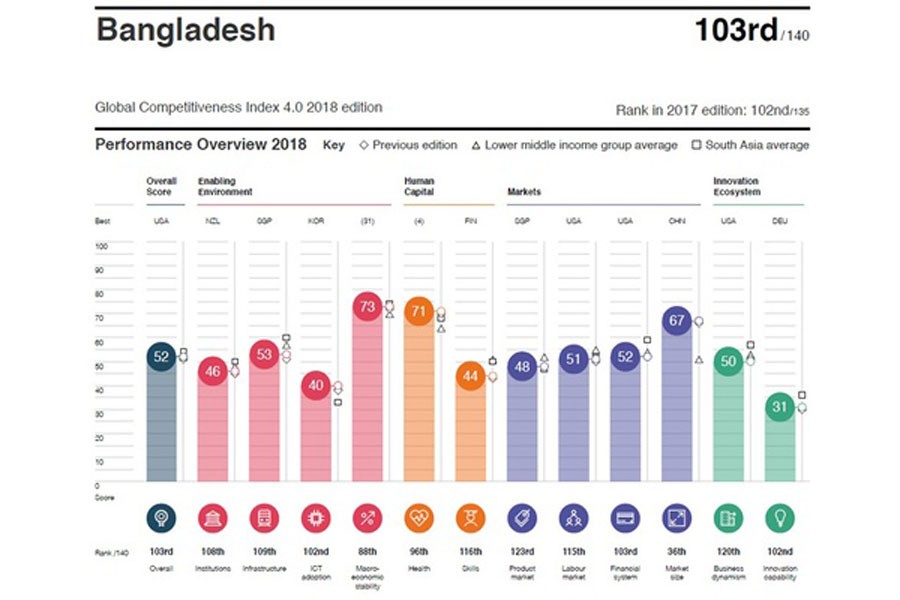That the country has slipped two more steps in this year's Global Competitiveness Index would surely add to the citizens' frustration. Last year, it had descended one step in contrast to a seven-step ascent in 2017. Sadly enough, this year, there has been erosion in the country's competitiveness in 10 out of 12 areas that the World Economic Forum (WEF) takes into cognizance while preparing the index. The product market and health are two areas where it scored better and scaled up four and three steps respectively.
Bangladesh has not been able to make much headway in a number of areas that are important in improving a country's ability to compete. The government has taken some policy measures to improve the situation, but those are yet to show results. The country's scorecard in areas of institutions, infrastructures, ICT adoption, skills, banks' soundness, business dynamism, innovation etc., is not encouraging.
The WEF's competitiveness report is an interaction-based one and it is, basically, prepared on the basis of opinion given by businesses on some selected issues. The interactions, as far as Bangladesh is concerned, have again brought to the fore the areas that have been highly problematic for decades. Institutions and governance, according to the WEF report, are the weakest areas in business competitiveness. However, barring railway, the businesses have appreciated the improvements in road, water and air transportation infrastructures in recent years.
The availability of quality manpower is yet another very important factor for strengthening a country's ability to compete globally. Bangladesh has a huge population. Some people tend to consider it a burden and some others a great asset. But the fact remains that a population, no matter how big its size is, remains a burden unless it is adequately skilled to meet the demand of the time. Unfortunately, Bangladesh is lagging far behind in this area. It is evident from the fact that the domestic industries and corporations feel compelled to hire from abroad the manpower trained in latest technology and management system.
Corruption, which is seriously hurting the country's ability to compete globally, has figured prominently in the Bangladesh aspect of the WEF report. More than three-fourths of businesses who were interviewed in connection with the preparation of the report alleged that they were required to bribe the people concerned to win public sector contracts or expedite the process of export-import activities. The majority of the respondents also doubted the credibility of the country's judiciary.
The factors that have been eroding the country's competitiveness or holding it back from going forward are products of mal-governance. Many national institutions are failing to deliver or malfunctioning just because of poor quality governance. The government does adopt scores of good policy measures that, if implemented religiously, are bound to help strengthen the country's competitiveness. But, the lack of seriousness in policy enforcement remains a major problem in this country.
The country needs to improve its competitive ability to help materialise the dream of furthering the economic growth prospects. A major jump within a short time will not be possible. Even a slow but steady improvement in the country's global competitiveness would require a major change in attitude and modus operandi of the people manning the different tiers of the administration, trade, industry, education, judiciary etc. However, the question - how long before that change takes place? -- is likely to agitate the minds of many.


